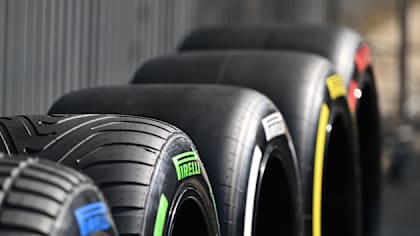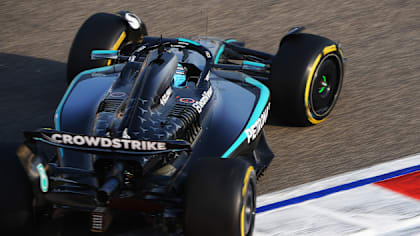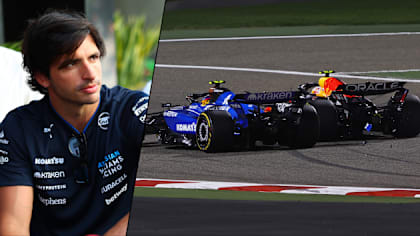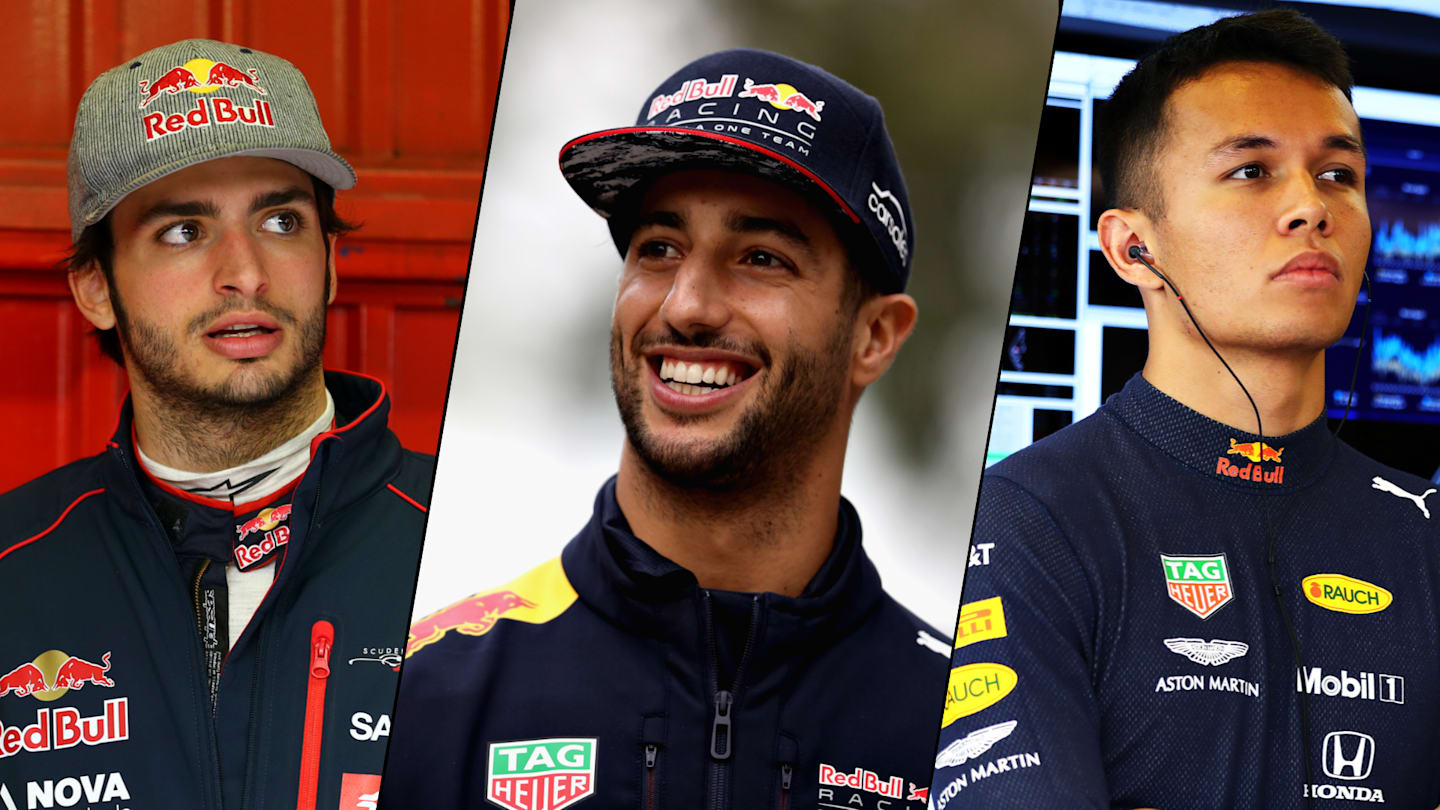
Feature
IN NUMBERS: How Verstappen’s team mates fared against him with Tsunoda the latest to step up

Share

Having achieved four World Championships, 63 wins, 113 podiums and 40 pole positions during his 10+ years in Formula 1 so far, Max Verstappen has ensconced himself amongst the most successful drivers in the sport’s history – which could make the prospect of becoming his team mate a slightly daunting one.
It is a task that now awaits Yuki Tsunoda, with the 24-year-old set to race alongside Verstappen at Red Bull as of the Japanese Grand Prix after the squad opted to swap him with Liam Lawson following a tough opening two races for the New Zealander. Tsunoda will be Verstappen’s seventh team mate in F1 – but how will he fare compared to those who took on that role before him?
We’ve delved into the statistics to see how each of the six drivers to previously share a garage with Verstappen have performed in comparison to the Dutchman…
Carlos Sainz – Toro Rosso
2015 (19 races as team mates):
Qualifying head-to-head: Sainz 10 – 9 Verstappen / Race head-to-head: Sainz 7 – 10 Verstappen
Points scored: Sainz – 18 (36.8% of races finished in points), 15th in championship / Verstappen – 49 (52.6% of races finished in points), 12th in championship
Pole positions: Sainz 0 (0%) / Verstappen 0 (0%)
Podiums: Sainz 0 (0%) / Verstappen 0 (0%)
Wins: Sainz 0 (0%) / Verstappen 0 (0%)
The 2015 season saw an all-rookie line-up join Toro Rosso in the form of Verstappen and Carlos Sainz, with the former becoming the youngest driver to make their debut at 17 years and 164 days old. Sainz made an early impression by scoring points in his first race, while Verstappen retired with an engine failure.
As the numbers show, the two drivers were closely matched in the head-to-heads throughout the season. Sainz suffered more mechanically-related retirements – particularly during the middle of the campaign – and it was Verstappen who ended 2015 with more points.
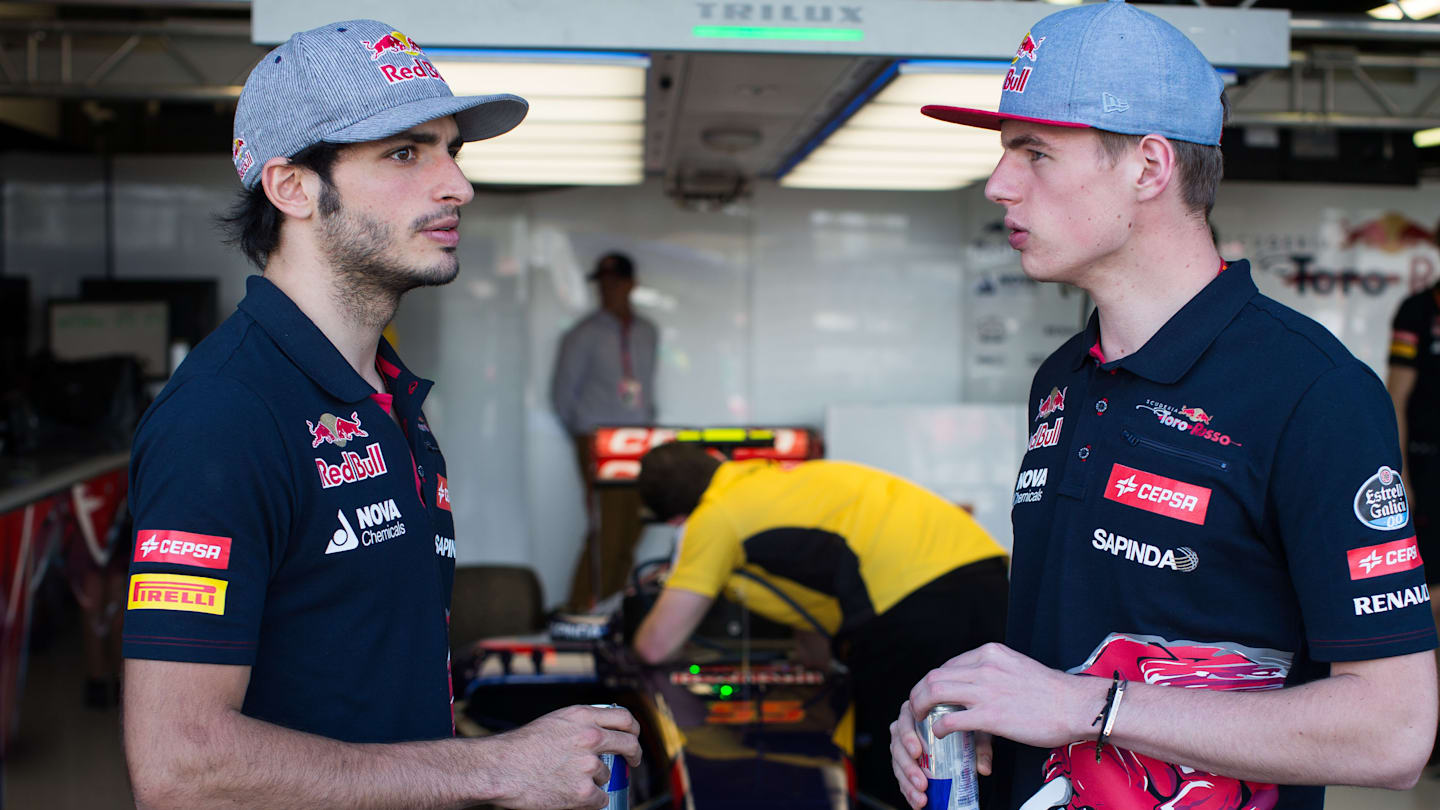
Sainz and Verstappen both arrived as rookies at the Toro Rosso team in 2015
2016 (four races as team mates):
Qualifying head-to-head: Sainz 1 – 3 Verstappen / Race head-to-head: Sainz 2 – 2 Verstappen
Points scored: Sainz – 4 (50% of races finished in points), 12th in championship (points total 46 for whole season) / Verstappen – 13 (75% of races finished in points), fifth in championship (points total 204 for whole season)
Pole positions: Sainz 0 (0%) / Verstappen 0 (0%)
Podiums: Sainz 0 (0%) / Verstappen 0 (0%)
Wins: Sainz 0 (0%) / Verstappen 0 (0%)
It transpired to be a much shorter tenure as team mates for Verstappen and Sainz in 2016, with Verstappen soon being promoted to the main Red Bull outfit after just four races. But in those few Grands Prix together prior to the driver switch, they were again relatively well-matched.
Verstappen just edged Sainz in terms of points finishes on three to two, while both drivers suffered a DNF due to a technical issue.
Daniel Ricciardo – Red Bull
2016 (17 races as team mates):
Qualifying head-to-head: Ricciardo 11 – 6 Verstappen / Race head-to-head: Ricciardo 10 – 7 Verstappen
Points scored: Ricciardo – 220 (100% of races finished in points), third in championship (points total 256 for whole season) / Verstappen – 191 (82.4% of races finished in points), fifth in championship (points total 204 for whole season)
Pole positions: Ricciardo 1 (5.9%) / Verstappen 0 (0%)
Podiums: Ricciardo 8 (47.1%) / Verstappen 7 (41.2%)
Wins: Ricciardo 1 (5.9%) / Verstappen 1 (5.9%)
A new era began for Verstappen when he made the step up to Red Bull only a few races into his sophomore season, with the Dutchman partnering Daniel Ricciardo at the team while Daniil Kvyat was sent back to Toro Rosso.
Verstappen’s arrival was certainly a memorable one, the youngster winning on his debut for the squad in Spain. He was ultimately beaten by the more experienced Ricciardo in the head-to-heads – the Australian having a particularly strong year in which he finished a career-best third in the championship – but the Dutchman was equal on wins with his team mate and only scored one less podium.
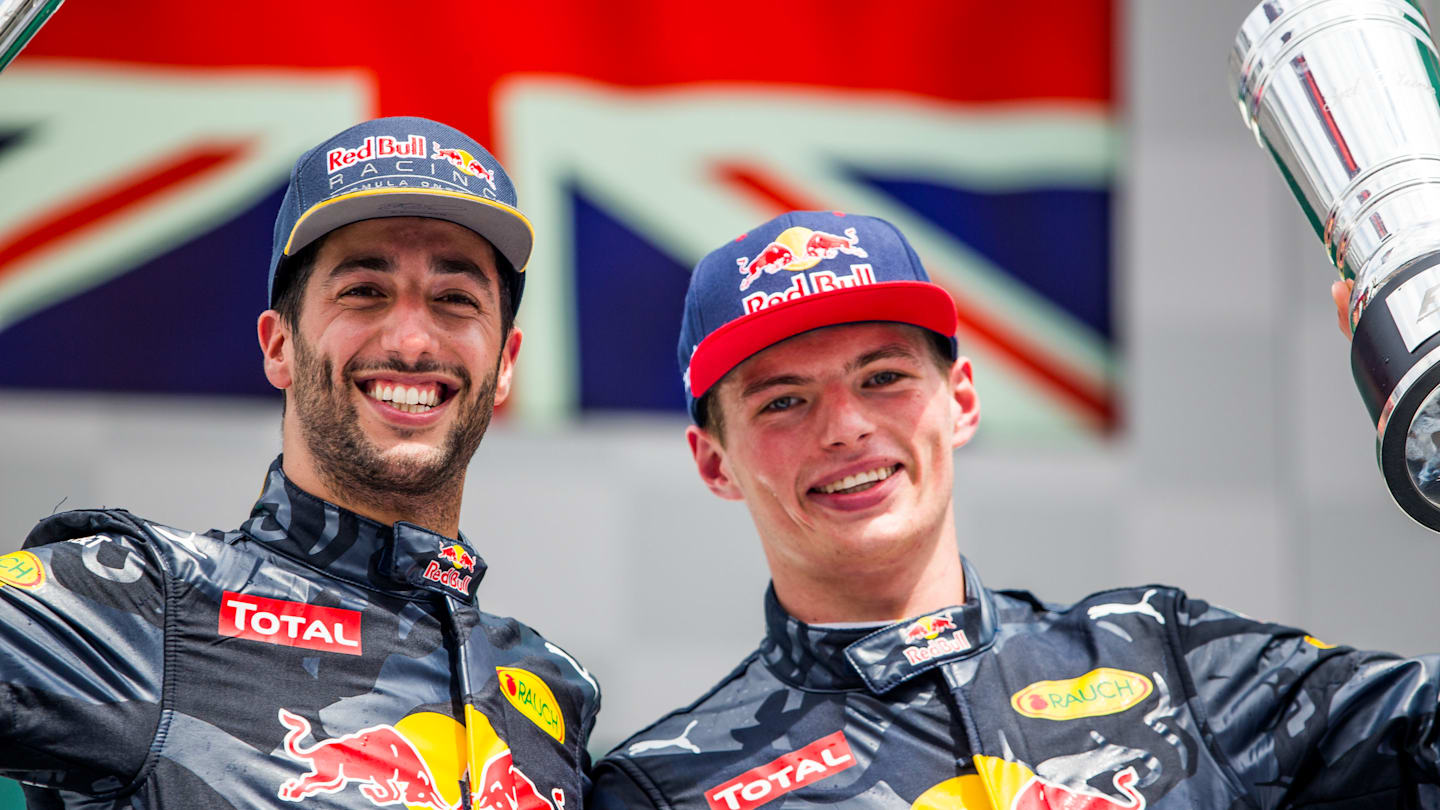
Ricciardo and Verstappen shared a good relationship off the track, while also being unafraid to push each other when the visor came down
2017 (20 races as team mates):
Qualifying head-to-head: Ricciardo 7 – 13 Verstappen / Race head-to-head: Ricciardo 9 – 11 Verstappen
Points scored: Ricciardo – 200 (70% of races finished in points), fifth in championship / Verstappen – 168 (65% of races finished in points), sixth in championship
Pole positions: Ricciardo 0 (0%) / Verstappen 0 (0%)
Podiums: Ricciardo 9 (45%) / Verstappen 4 (20%)
Wins: Ricciardo 1 (5%) / Verstappen 2 (10%)
The 2017 campaign was a weaker one for Red Bull, with the team often facing reliability issues. Verstappen experienced more retirements than Ricciardo earlier in the season but enjoyed a stronger run at the end, taking two wins in the final six races.
Ricciardo had scored more points by the campaign’s end, yet Verstappen beat his team mate in terms of the Qualifying and race day head-to-heads as he continued to hone his skills.
2018 (21 races as team mates):
Qualifying head-to-head: Ricciardo 7 – 14 Verstappen / Race head-to-head: Ricciardo 5 – 14 Verstappen
Points scored: Ricciardo 170 (61.9% of races finished in points), sixth in championship / Verstappen – 249 (81% of races finished in points), fourth in championship
Pole positions: Ricciardo 2 (9.5%) / Verstappen 0 (0%)
Podiums: Ricciardo 2 (9.5%) / Verstappen 11 (52.4%)
Wins: Ricciardo 2 (9.5%) / Verstappen 2 (9.5%)
A season in which the momentum looked to switch in Verstappen’s favour. While Ricciardo clinched two wins during the early stages – in contrast to Verstappen’s tough start to the year – this transpired to be the Australian’s only visits to the podium in 2018.
Verstappen, meanwhile, collected 11 rostrums and outscored his team mate on most counts, though pole position still eluded him and Ricciardo suffered more mechanical DNFs. Both drivers failed to finish in Bahrain and Azerbaijan, with the latter the scene of an infamous collision between them. Ricciardo opted to leave for pastures new at the end of the season, making the switch to Renault for 2019.
ALL THE ANGLES: Ricciardo and Verstappen's Baku crash
Pierre Gasly – Red Bull
2019 (12 races as team mates):
Qualifying head-to-head: Gasly 1 – 11 Verstappen / Race head-to-head: Gasly 1 – 11 Verstappen
Points scored: Gasly – 63 (75% of races finished in points), seventh in championship (points total 95 for whole season) / Verstappen – 181 (100% of races finished in points), third in championship (points total 278 for whole season)
Pole positions: Gasly 0 (0%) / Verstappen 1 (5.3%)
Podiums: Gasly 0 (0%) / Verstappen 5 (26.3%)
Wins: Gasly 0 (0%) / Verstappen 2 (10.5%)
With a vacancy at Red Bull following Ricciardo’s exit, the team promoted Pierre Gasly from Toro Rosso to partner Verstappen.
The Frenchman struggled to match his team mate in the head-to-heads, though the numbers show that he displayed decent consistency, finishing all but three of his races for Red Bull in the points. This was not enough to keep him at the team, however, with bosses opting to send him back to Toro Rosso for the rest of the season after Round 12 in Hungary.
Alex Albon – Red Bull
2019 (nine races as team mates):
Qualifying head-to-head: Albon 1 – 8 Verstappen / Race head-to-head: Albon 4 – 5 Verstappen
Points scored: Albon – 76 (88.9% of races finished in points), eighth in championship (points total 92 for whole season) / Verstappen – 97 (77.8% of races finished in points), third in championship (points total 278 for whole season)
Pole positions: Albon 0 (0%) / Verstappen 1 (5.3%)
Podiums: Albon 0 (0%) / Verstappen 4 (21.1%)
Wins: Albon 0 (0%) / Verstappen 1 (5.3%)
Next to step up was Alex Albon, who enjoyed a solid run in his nine races for Red Bull in 2019 after being swapped with Gasly.
The Thai driver finished every race in the points – with the exception being Brazil, where he was on course for a podium before contact with Lewis Hamilton dropped him down the order. His performances helped to earn him another season at the Milton Keynes outfit in 2020.
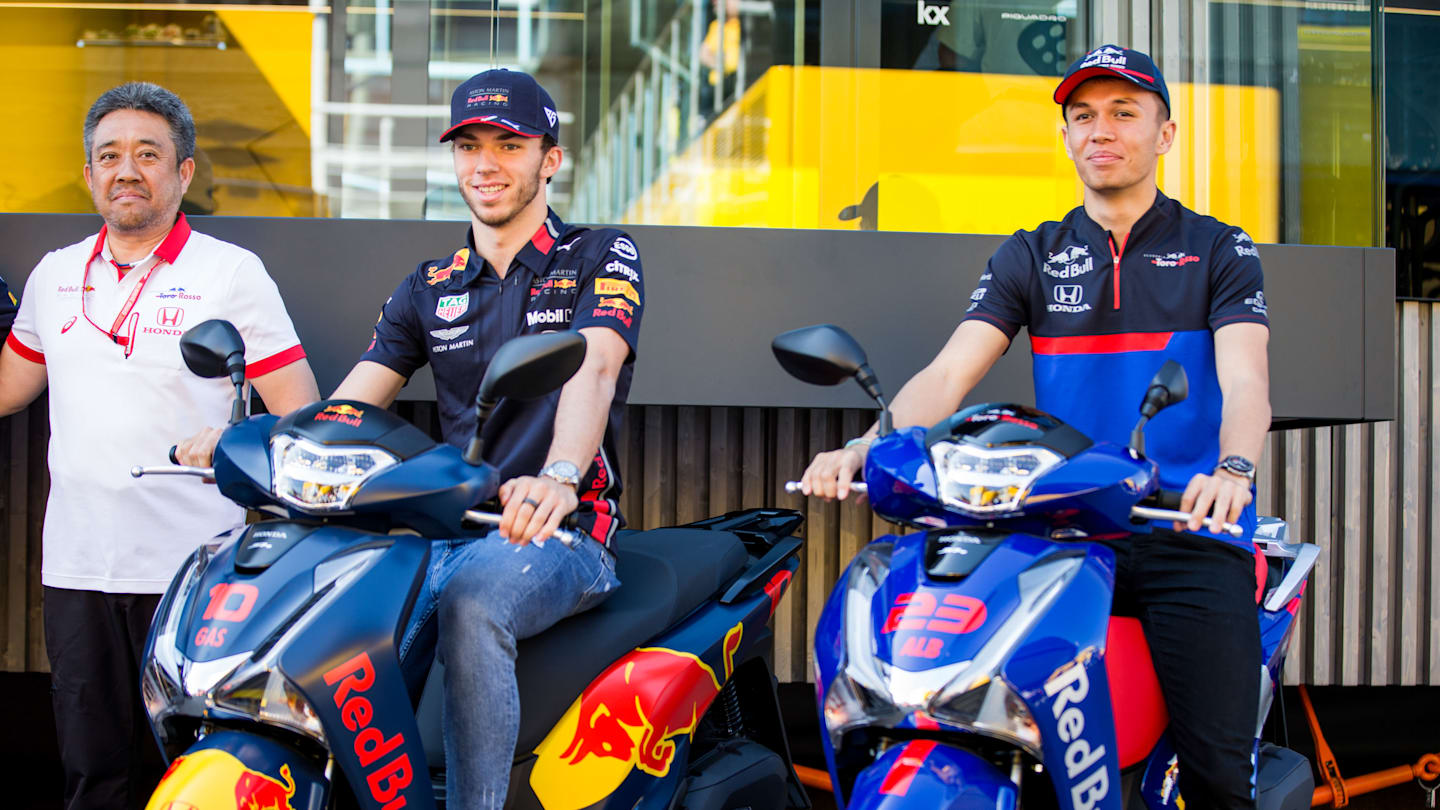
Gasly started the 2019 season as Verstappen's team mate before a seat swap with Albon took place midway through the year
2020 (17 races as team mates):
Qualifying head-to-head: Albon 0 – 17 Verstappen / Race head-to-head: Albon 5 – 12 Verstappen
Points scored: Albon – 105 (70.6% of races finished in points), seventh in championship / Verstappen – 214 (70.6% of races finished in points), third in championship
Pole positions: Albon 0 (0%) / Verstappen 1 (5.9%)
Podiums: Albon 2 (11.8%) / Verstappen 11 (64.7%)
Wins: Albon 0 (0%) / Verstappen 2 (11.8%)
The 2020 campaign – a shortened season owing to the COVID-19 pandemic – was a tougher one for Albon, with Verstappen proving dominant in qualifying form as well as outscoring him in race trim.
Albon came away with his debut podium at Mugello – which he followed up with a second in Bahrain – but Red Bull again opted to make a change, leading to the Thai racer becoming their test and reserve driver for 2021.
Sergio Perez – Red Bull
2021 (22 races as team mates):
Qualifying head-to-head: Perez 2 – 20 Verstappen / Race head-to-head: Perez 3 – 19 Verstappen
Points scored: Perez – 190 (72.7% of races finished in points), fourth in championship / Verstappen – 395.5 (86.4% of races finished in points), first in championship
Pole positions: Perez 0 (0%) / Verstappen 10 (45.5%)
Podiums: Perez 5 (22.7%) / Verstappen 18 (81.8%)
Wins: Perez 1 (4.5%) / Verstappen 10 (45.5%)
In a move that saw Red Bull take the unusual step of looking outside of their driver programme, the experienced Sergio Perez was signed for 2021.
While the Mexican could not prove a match for Verstappen, he provided a solid supporting role in a season best remembered for the fierce title battle that unfolded between Verstappen and Lewis Hamilton. It was confirmed during the summer that Perez would remain at Red Bull in 2022.
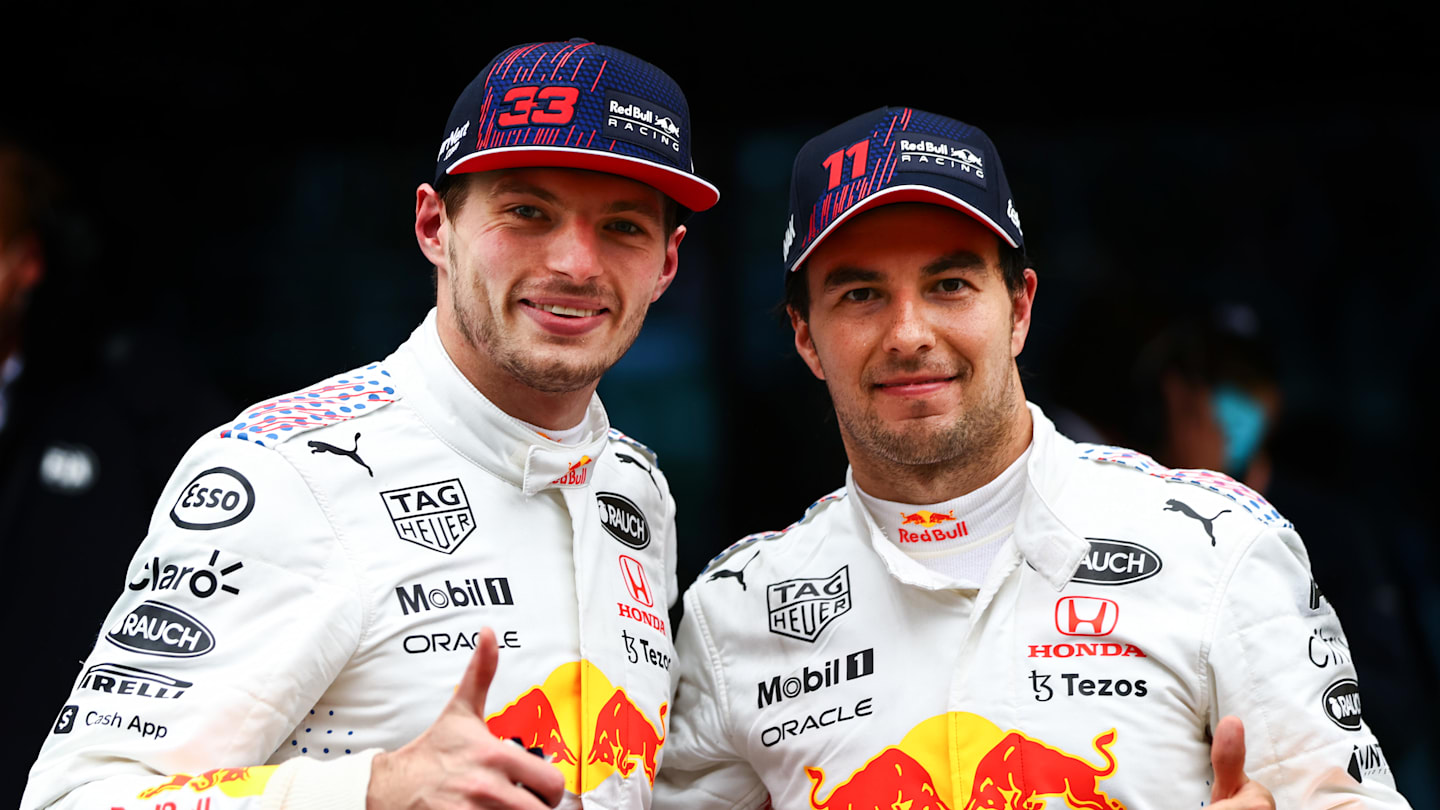
Perez played a supporting role as Verstappen fought for his first world championship in 2021
2022 (22 races as team mates):
Qualifying head-to-head: Perez 5 – 17 Verstappen / Race head-to-head: Perez 5 – 17 Verstappen
Points scored: Perez – 305 (86.4% of races finished in points), third in championship / Verstappen – 454 (90.9% of races finished in points), first in championship
Pole positions: Perez 1 (4.5%) / Verstappen 7 (31.8%)
Podiums: Perez 11 (50%) / Verstappen 17 (77.3%)
Wins: Perez 2 (9.1%) / Verstappen 15 (68.2%)
Despite a nightmare first race that saw both drivers retire with the same mechanical issue, Red Bull’s 2022 season soon picked up and the team enjoyed an increasingly dominant campaign.
Verstappen won the drivers’ title with four races to spare, while Perez built on his 2021 form to double his number of podiums and wins, as well as taking a debut pole position.
2023 (22 races as team mates):
Qualifying head-to-head: Perez 3 – 19 Verstappen / Race head-to-head: Perez 2 – 20 Verstappen
Points scored: Perez – 285 (86.4% of races finished in points), second in championship / Verstappen – 575 (100% of races finished in points), first in championship
Pole positions: Perez 2 (8.7%) / Verstappen 12 (52.2%)
Podiums: Perez 9 (39.1%) / Verstappen 21 (91.3%)
Wins: Perez 2 (8.7%) / Verstappen 19 (82.6%)
The 2023 statistics make for astonishing reading on Verstappen’s side, a year in which the Dutch driver claimed a record-breaking 19 victories out of 23 races to seal his most assured title yet.
So commanding was Verstappen’s performance that he scored 290 more points than Perez – despite the Mexican finishing a career-best second in the championship.
Sergio Perez's best moments for Red Bull
2024 (24 races as team mates):
Qualifying head-to-head: Perez 1 – 23 Verstappen / Race head-to-head: Perez 1 – 23 Verstappen
Points scored: Perez – 152 (66.7% of races finished in points), eighth in championship / Verstappen – 437 (95.8% of races finished in points), first in championship
Pole positions: Perez 0 (0%) / Verstappen 8 (33.3%)
Podiums: Perez 4 (16.7%) / Verstappen 14 (58.3%)
Wins: Perez 0 (0%) / Verstappen 9 (37.5%)
A 1-2 result at the season-opening Bahrain Grand Prix initially suggested that Red Bull’s 2023 advantage over the rest of the field would repeat in 2024 – but it proved to be a different picture as the campaign developed, with the team’s rivals dramatically closing the gap.
While Verstappen held on to take his fourth title, it was a nightmare season for Perez, who failed to finish on the podium again after Round 5 in China. Red Bull subsequently slipped from first to third in the Teams’ Championship, and an agreement was reached between Perez and the team after the season had concluded to part ways with immediate effect.
Liam Lawson – Red Bull
2025 (two races as team mates):
Qualifying head-to-head: Lawson 0 – 2 Verstappen / Race head-to-head: Lawson 0 – 2 Verstappen
Points scored: Lawson – 0 (0% of races finished in points), 17th in championship (still ongoing) / Verstappen – 36 (100% of races finished in points), second in championship (still ongoing)
Pole positions: Lawson 0 (0%) / Verstappen 0 (0%)
Podiums: Lawson 0 (0%) / Verstappen 1 (50%)
Wins: Lawson 0 (0%) / Verstappen 0 (0%)
Following the exit of Perez, Red Bull opted to promote Liam Lawson to the squad for the 2025 season. But his tenure as Verstappen’s team mate proved to be the shortest of all, with the New Zealander struggling to get comfortable with the RB21.
After qualifying at the back of the field for both of the season’s opening races – while Verstappen took P3 and P4 respectively – Lawson crashed out during a rain-affected debut for the team in Melbourne before ending the Chinese Grand Prix well outside of the points.
Red Bull subsequently made the decision to switch Lawson with Racing Bulls’ Yuki Tsunoda from Round 3 onwards – meaning that the driver from Japan will be the next one to pit himself against Verstappen as the Dutchman seeks to defend his title…
This article was originally published on 12 January 2025 after Lawson was promoted to Red Bull
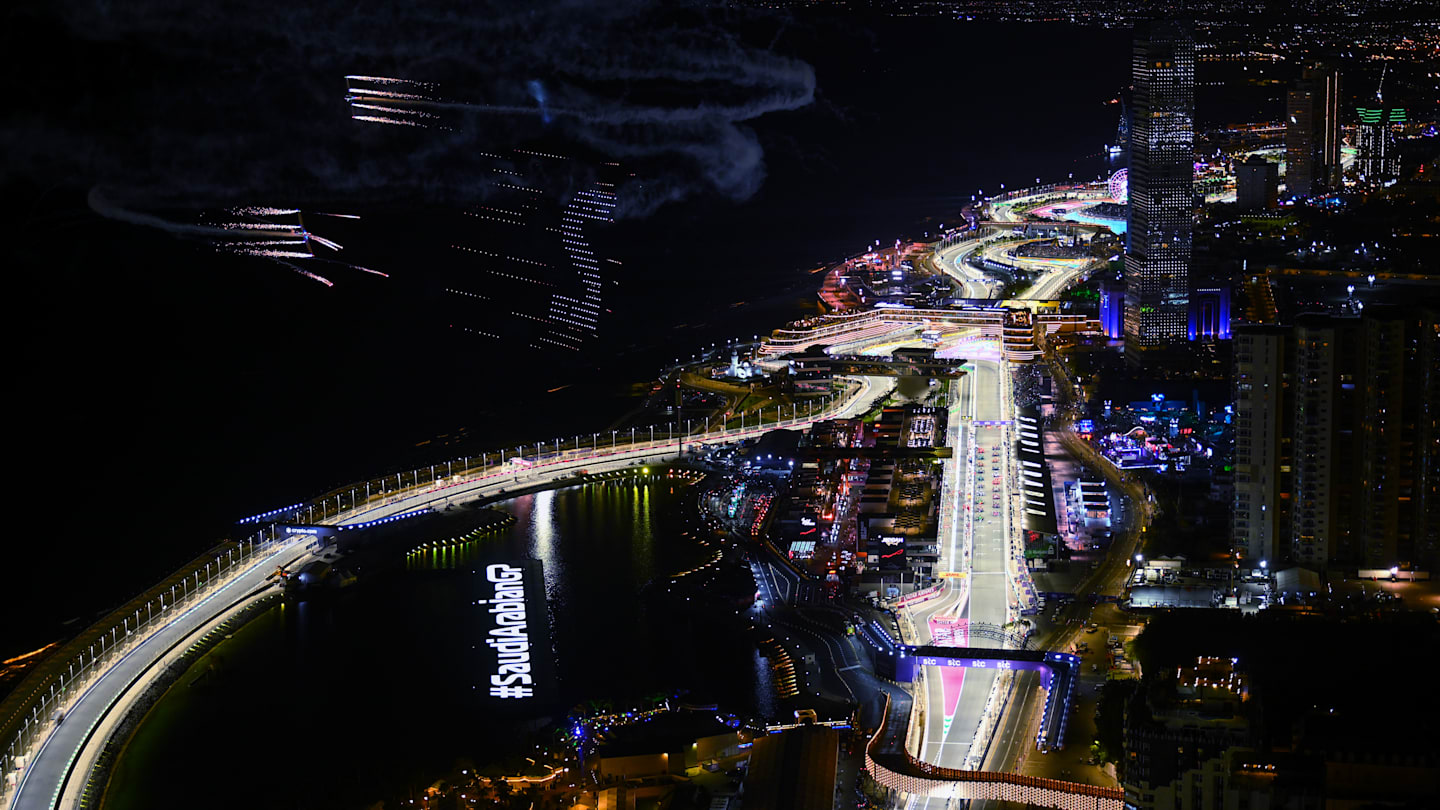
RACE TICKETS - SAUDI ARABIA
Don't miss your chance to experience the fastest street circuit in Formula 1...
YOU MIGHT ALSO LIKE
News What tyres will the teams and drivers have for the 2025 Saudi Arabian Grand Prix?
Feature F1 FANTASY: Strategist Selection – What’s the best line-up for the Saudi Arabian Grand Prix?
Podcast BEYOND THE GRID: Esteban Ocon on why he’s feeling at home with Haas
News Sainz concedes he needs to 'pick fights a bit better' after race-ending contact with Tsunoda in Bahrain

